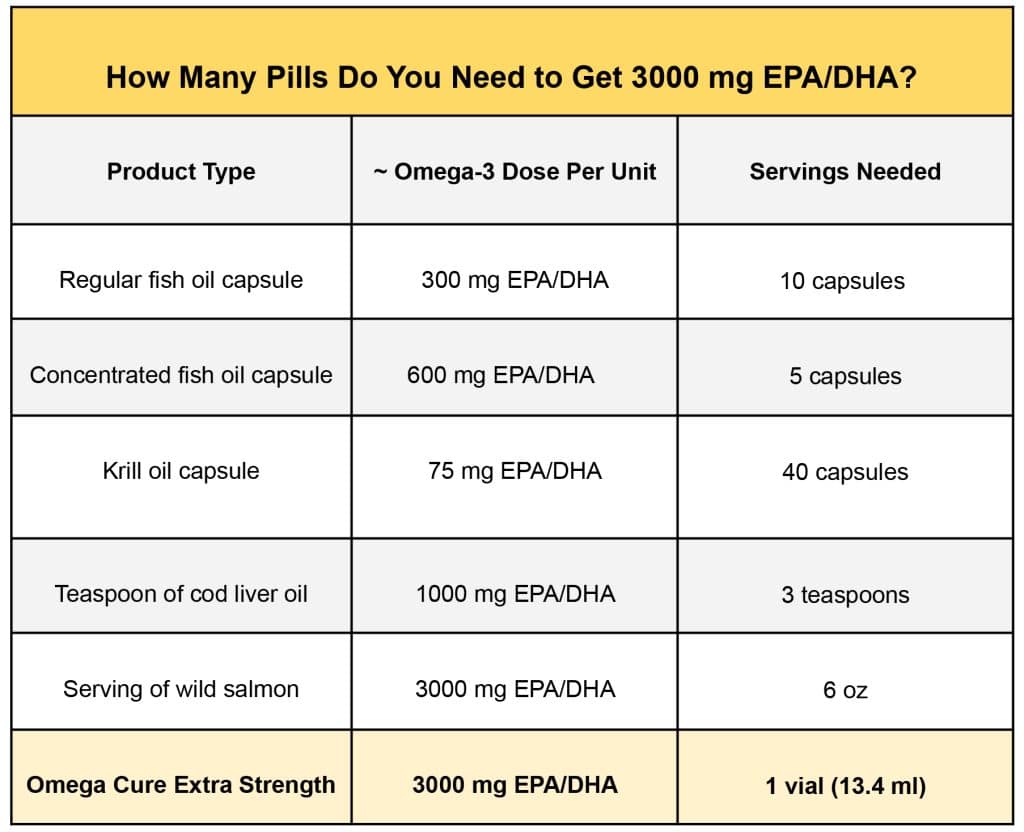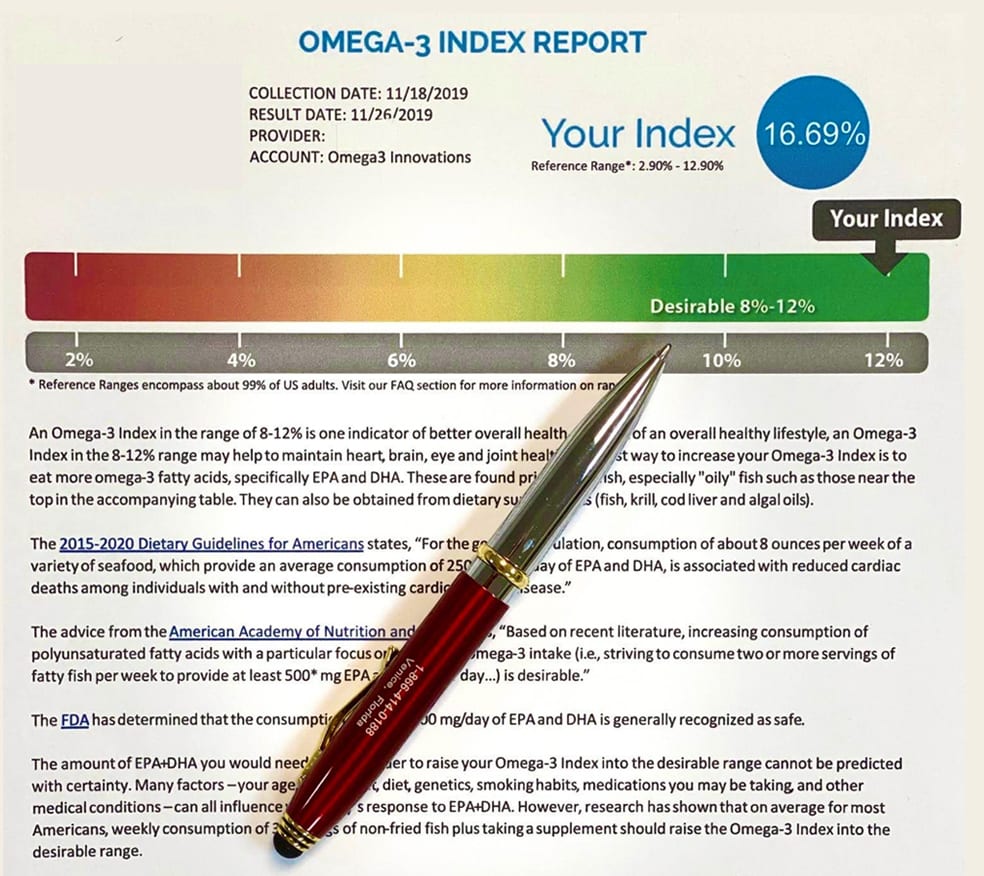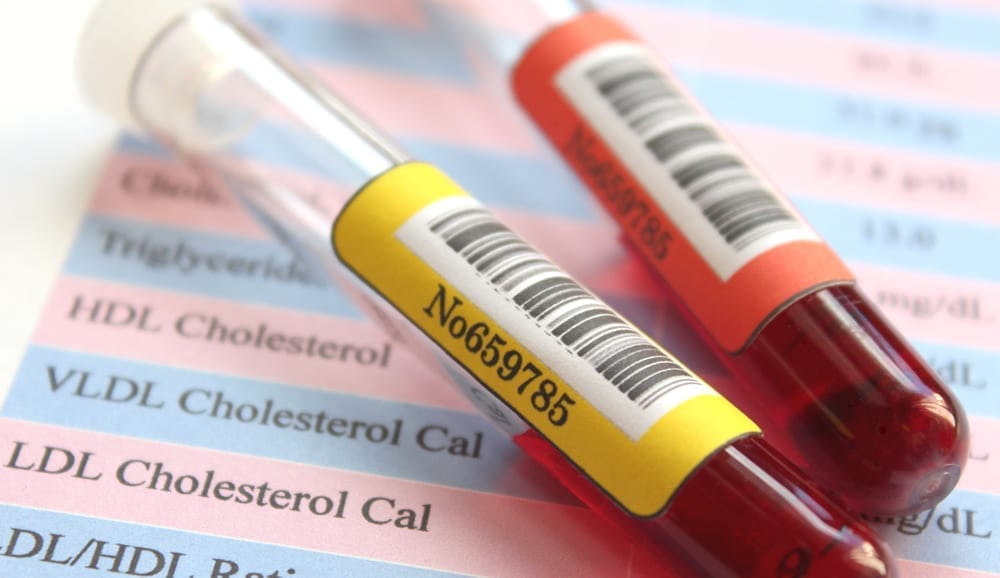Does Taking Fish Oil Lower Cholesterol?
Many people believe that incorporating omega-3s into their diet will solve their cholesterol woes. But the truth is much more nuanced; it’s not as simple as taking a daily fish oil capsule or drinking a teaspoon of cod liver oil.
In this article, we’ll uncover how these essential fatty acids impact your lipid profile – plus look at how much omega-3 you need to reap the benefits.
Many people believe that incorporating omega-3s into their diet will solve their cholesterol woes. But the truth is much more nuanced; it’s not as simple as taking a daily fish oil capsule or drinking a teaspoon of cod liver oil.
In this article, we’ll uncover how these essential fatty acids impact your lipid profile – plus look at how much omega-3 you need to reap the benefits.
Cholesterol Is More Than One Thing
The term “cholesterol” often gets tossed around as though it were a single concept. But really, cholesterol includes several measurements.
When you take a lipid test, the results are broken down into a few main components:
Triglycerides: Our bodies convert the extra calories, fat and sugars we eat into triglycerides. Having too high triglyceride levels is bad.
LDL: LDL, or low-density lipoproteins, is commonly referred to as the “bad” cholesterol. It builds up plaque in the arteries. LDL can be further analyzed by particle size. Small, dense particles are considered more harmful than large, fluffy particles.
HDL: HDL, or high-density lipoproteins, are the “good” cholesterol. Having a higher number is better.
Total Cholesterol: Your total cholesterol number is based on the other three components. Here’s the formula: HDL + LDL + 20% triglycerides = total cholesterol.
Omega-3s impact these numbers in different ways. Let’s take a closer look at what the science shows.
Triglyceride Levels
Studies show that taking omega-3s will consistently lower triglyceride levels. But the effect depends on how much you consume.
Higher doses of omega-3s (specifically, the EPA and DHA kind) are needed to significantly reduce triglyceride levels. For example, a 2020 review from researchers in Norway highlighted the following trend [1]:
• 850 mg of EPA/DHA lowered triglycerides by only 3.4%.
• 2400 mg of EPA/DHA lowered triglycerides by 16%.
• 5100 mg of EPA/DHA lowered triglycerides by 27%.
On average, studies report that taking between 3000 – 4000 mg of EPA/DHA will translate to a 25% drop in triglyceride levels [2].
Of course, the actual impact for any individual will depend on many factors, like genetics, age, gender, and your baseline triglyceride levels (higher starting numbers mean a more impressive drop)[2].
There’s also the quality of the omega-3 product to consider, including the freshness level of the oil. Here at Omega3 Innovations, some customers have seen up to a 50% drop in their triglyceride levels.

Umpteen capsules: To get an effective omega-3 dose, you typically have to be prepared to swallow a handful of capsules every day.
Can Fish Oil Pills Lower Triglyceride Levels?
Most regular fish oil capsules contain only 300 mg of EPA/DHA. With that serving size, you would need to take 10 or more capsules every day to get an adequate dose.
Concentrated omega-3 products can deliver higher doses of EPA and DHA in a smaller serving size. But even with prescription omega-3 oils aimed at managing hyperlipidemia, you have to take at least 4 capsules daily.
At Omega3 Innovations, we offer 3000 mg EPA/DHA in a pre-measured, drinkable single serving. This liquid form makes it easier for people to meet their omega-3 needs and experience beneficial effects.
LDL Cholesterol
While the benefits of omega-3s for triglyceride levels are widely known and accepted, their effects on LDL levels are more complex.
Again, there are different types of LDL cholesterol. On a lipid panel, people typically pay the greatest attention to the LDL-C value. Most studies show that omega-3s don’t really impact LDL-C. However, one exception seems to be for people with very high triglyceride levels (>500mg/dl). For these people, omega-3s may increase LDL somewhat [2].
There’s also Lp(a), or a type of low-density LDL that can create plaque in your arteries. Most studies (but not all) note a modest decrease in this value with omega-3s, which is good [2].
Finally, omega-3s seem to facilitate a shift from small dense LDL particles to bigger and lighter large buoyant LDL when looking at particle size. This is positive, since small dense LDL is more likely to create arterial plaque. Indeed, shifting from small dense to large buoyant LDL is associated with lower heart disease risk [3].
HDL Cholesterol
When it comes to HDL cholesterol, research suggests that omega-3s have little effect in general.
The exception is again for people with very high triglycerides. In these cases, omega-3s may increase the HDL levels by more than 10%. This is positive, since HDL is the “good” cholesterol [2].
Oil Quality & Genetic Differences?
For years, numerous Omega3 Innovations consumers have shared that their LDL levels decreased and HDL increased after taking Omega Cure®. This anecdotal feedback does not align with the greater body of omega-3 research; it is also not true for all customers either.
Consequently, we’ve often wondered if the fresh, full-spectrum composition of Omega Cure could play a role here? Or, could it all come down to genetic factors, yet to be uncovered in larger studies? Only time and more research will tell.

Beyond cholesterol: Research suggests other markers may provide a better picture of cardiovascular risk and more. One of these metrics is the omega-3 index.
What’s the Best Measure of Heart Disease Risk & Overall Health?
For decades, doctors have used cholesterol tests to help determine the health of their patients. However, recent studies now suggest that these values alone do not tell us as much about cardiovascular risk as previously thought; other markers may be more informative. These include:
Consider Your Triglyceride/HDL Ratio
Many studies show that your ratio of triglycerides to HDL may be a more important number than looking at your total cholesterol. Having a high triglyceride: HDL ratio is associated with heart disease, insulin resistance, and low testosterone levels in men. Interestingly, the risk seems to be independent of bad cholesterol numbers or medication use [4, 5, 6].
To calculate the ratio, simply divide your triglyceride number by your HDL number. A ratio higher than 4 indicates a considerable amount of risk. The goal is to have a ratio below 2 [7].
Taking sufficient doses of omega-3s will typically reduce the triglycerides to HDL ratio. This improvement could be one of the reasons for the purported heart health benefits of these fatty acids.
Evaluate Your Omega-3 Index
The omega-3 index has also come to the forefront as a heart health metric. Indeed, one study indicated it could be a better predictor of heart health and longevity than cholesterol levels [8].
The omega-3 index measures the amount of EPA and DHA omega-3s found in your red blood cells. Generally speaking, the higher the number, the better.
Improving Cholesterol Beyond Omega-3s
While getting an adequate amount of omega-3s has the potential to improve your lipid numbers, it’s only one part of the puzzle.
As a doctor, I prioritize my medical strategy in the following order:
1. Don’t smoke.
2. Exercise regularly. This includes avoiding sitting in the same position for more than 45 minutes. Sitting for long periods of time raises your risk of high cholesterol and other negative health effects [9].
3. Get good nutrients. Eat antioxidant-rich fruits and vegetables every day. Enjoy fiber-rich foods, like oats and barley. And of course, load up on seafood and/or a fresh, full-spectrum fish oil, like Omega Cure.
4. Cut down on prepackaged foods. Premade foods are typically full of preservatives, bad fats, salt and sugar that can increase our cholesterol levels and harm our microbiome.
5. Avoid fried foods. Instead, bake or cook your meals as much as possible.
If these activities fail to bring your triglyceride/HDL ratio back into balance, genetic factors may be at play. In this case, medications could prove beneficial.
The Bottom Line
Omega-3s play an important role in maintaining healthy lipid levels; but the impact will depend on dose, genetics, and more.
If you want to increase your omega-3 intake, try Omega Cure Extra Strength. It’s an easy way to get 3000 mg of EPA/DHA without having to swallow umpteen capsules.
An Effective Omega-3 Dose, Made Simple
Experience the Omega3 Innovations difference for yourself with the most effective fish oil supplement on the market.
Buy Now
References:
1. Arnesen, H., Myhre, P. L., & Seljeflot, I. (2020). Very Long Chain Marine n-3 Polyunsaturated Fatty Acids in Atherothrombotic Heart Disease. A Brief Review, with a Focus on Metabolic Effects. Nutrients, 12(10), 3014.
2. Feingold, K. R. (Updated 2021). Triglyceride Lowering Drugs. In: Feingold KR, Anawalt B, Blackman MR, et al., editors. Endotext. South Dartmouth (MA): MDText.com, Inc.; 2000-.
3. Froyen, E. (2021). The Effects of Fat Consumption on Low-Density Lipoprotein Particle Size in Healthy Individuals: A Narrative Review. Lipids in Health and Disease, 20, 86.
4. Orsi, E., Penno, G., Solini, A., Bonora, E. & Renal Insufficiency And Cardiovascular Events (RIACE) Study Group (2021). Independent Association of Atherogenic Dyslipidaemia with All-Cause Mortality in Individuals with Type 2 Diabetes and Modifying Effect of Gender: A Prospective Cohort Study. Cardiovascular Diabetology, 20(1), 28.
5. Chauhan, A., Singhal, A., & Goyal, P. (2021). TG/HDL Ratio: A Marker for Insulin Resistance and Atherosclerosis in Prediabetics or Not? Journal of Family Medicine and Primary Care, 10(10), 3700–3705.
6. Liao, P. W., Chen, J. T. , Liu, S. P., & Ho, C. H. (2020). The Predictive Value of Serum Testosterone Level on the Functional Outcomes After Acute Ischemic Stroke in Males. The Aging Male, 23:5, 726-732.
7. Sigurdsson, A. F. (2014). The Triglyceride/HDL Cholesterol Ratio. Doc’s Opinion.
8. Harris, W. S., Tintle, N., Etherton, M. R., Vasan, R. S. (2018). The Omega-3 Index Can Serve as a Marker of Overall Health in Older Americans. Erythrocyte Long-Chain Omega-3 Fatty Acid Levels Are Inversely Associated with Mortality and with Incident Cardiovascular Disease: The Framingham Heart Study. Journal of Clinical Lipidology, 12(3).
9. Neighmond, P. (2011). Sitting All Day: Worse For You Than You Might Think. NPR.
Popular posts



Related posts







